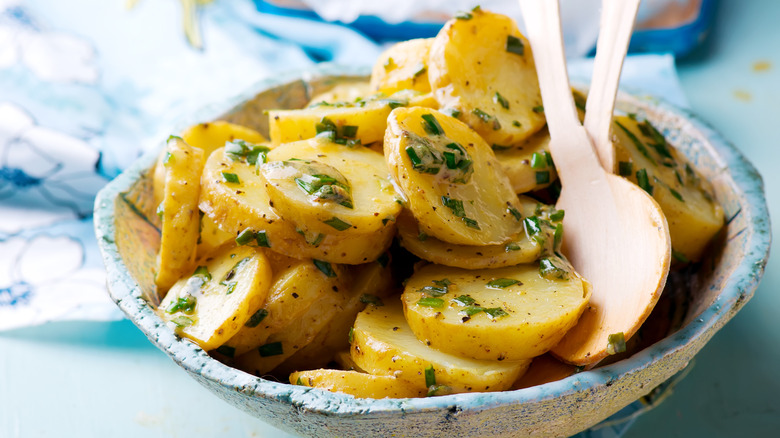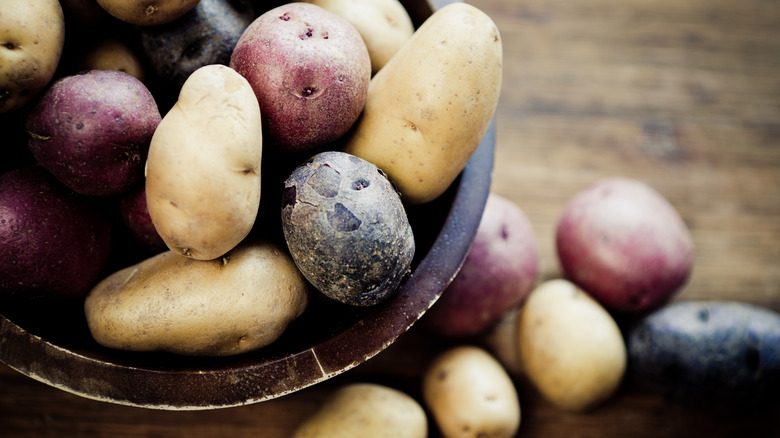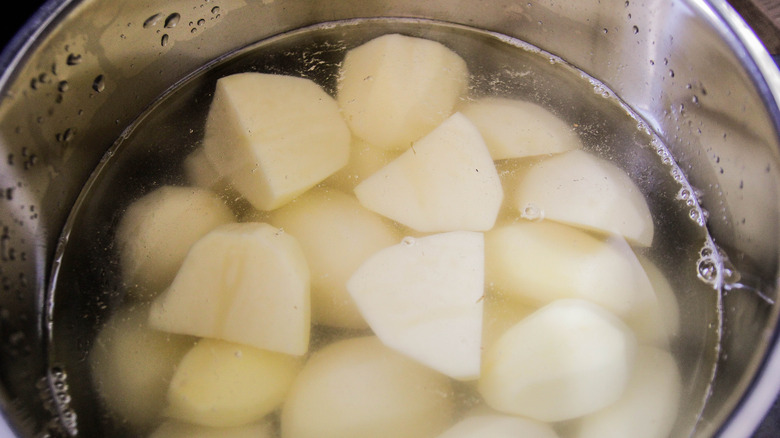How Long To Boil Potatoes For The Perfect Al Dente Bite
When boiling some kinds of potatoes, you want them soft through and through, even starting to come apart a bit — down that road lies mashed potatoes and pommes aligot, two luxuriantly creamy preparations. Other occasions, however, require a firmer potato. The whole world of potato salads, for instance: You want a tuber with structural integrity, whether it's going into an American-style or German-style potato salad, or even a Nicoise-type situation — there are a hundred ways to make a potato salad sing. But even if you're making something simpler — boiled new potatoes with good butter and herbs — only a potato with some bite to it will do.
This is a slightly taller order than just boiling potatoes until they fall apart and can be mashed. For one, there's no set amount of time for boiling your potatoes al dente, because it depends on a variety of factors — the type of potato, the size of potato, whether you're cooking them whole or cut into pieces. Generally, though, you should be able to boil them start to finish in 15 to 30 minutes. And with a little attention and a few tricks — like starting with cold water — the fully cooked but still firm and toothsome potato is eminently doable. Here's what you need to know.
Use the right potatoes and start with cold water
For a potato that'll maintain its bite after being boiled, stick to the waxy end of the spectrum: So, as opposed to the starchier varieties that make superior mashed potatoes — russets, Idahos — look for smaller red potatoes, new potatoes, or fingerlings. Yukon gold, another popular variety, is considered an all-purpose potato, somewhere between starchy and waxy. Fingerlings can cook up in 20 minutes or less; Yukon golds may take up to a half hour. One important step is to get your potatoes in roughly the same size — which may mean leaving smaller ones whole while cutting bigger ones into pieces.
In any potato, the starch that makes up the tuber is held together with pectin, a type of plant fiber (also used as a thickening agent in jams and jellies). Pectin breaks down when boiled, allowing the starch to absorb water — great for people who love mushy potatoes, not so good for the rest of us. One way to forestall this is to start your potatoes in cold water and bring them to a boil from there — this more gradual approach allows the outside of the potatoes (or potato pieces) to cook more slowly, so you don't end up with a situation where the exterior is falling apart while the center is still undercooked. When the water reaches a boil, lower the heat and maintain the pot at a simmer until the potatoes can be pierced with a fork.
Add vinegar to keep your potatoes firm
Another hack: Add a bit of vinegar to the boil, somewhere on the order of 1 tablespoon per quart of water. It doesn't matter whether it's white, apple cider, rice, or some other common, mild vinegar — the acidity also helps inhibit the breakdown of pectin, ensuring a firmer potato at the end of the process. Along with a generous helping of salt, vinegar in the cooking water may also impart a little tangy flavor; if it's a truly salt-and-vinegar potato you're after, feel free to go wild and add a bunch — like, a cup or so. As anybody with a serious potato-chip habit can tell you, salt, vinegar, and potatoes are naturally simpatico.
As with all boiled vegetables, one prudent move here is to drain the potatoes immediately when they're done cooking and rinse them with cold water — or, better yet, shock them in an ice bath. Otherwise, the residual heat from boiling will keep your veggies cooking even after you've taken them off the heat. An ice bath will stop this process cold — no pun intended — leaving you with the nice, firm potato you desire.


